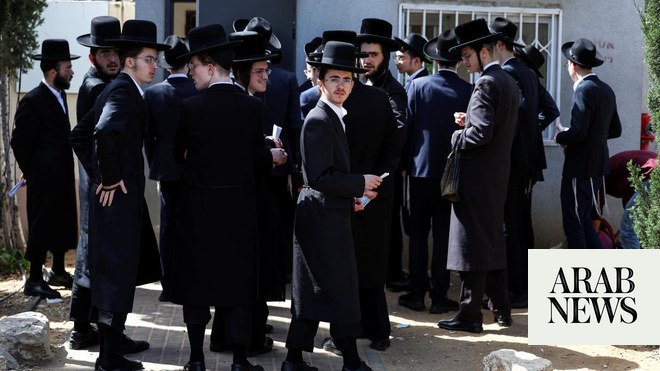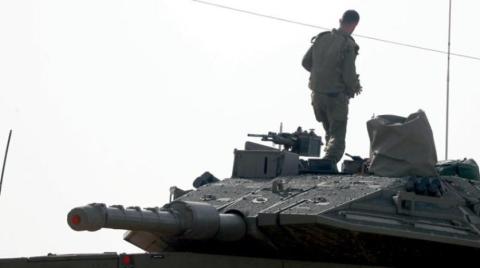
A proposed bill to extend compulsory military service to ultra-Orthodox students, historically exempt from conscription, has ignited a fierce debate in Israel, with Benjamin Netanyahu reportedly warning that failure to pass the law could jeopardise the stability of the government.
Israel has mandatory army service but for decades made an exemption for ultra-Orthodox Jews, also known as Haredi, who are allowed to continue full-time Torah study. The proposal, as Israel approaches six months since the 7 October Hamas attacks that began the war in Gaza, seeks to extend the duration of military service for conscripts and raise the age for reservists, while also urging an end to the customary exemptions granted to yeshiva students.
It envisages ultra-Orthodox battalions in the Israel Defense Forces but does not set an annual quota for the enlistment of Haredi men.
The bill has ignited a contentious debate in Israel. A cabinet meeting to discuss it was postponed at the last minute on Tuesday with no new date set after ultra-Orthodox party leaders met Netanyahu and, according to reports, refused to attend. The prime minister has informed ministers in his Likud party that he is standing firm while Benny Gantz, a political rival of Netanyahu, has declared his willingness to resign from the emergency unity government if the law is approved, calling it a political compromise rather than a conscription solution for all society.
“The people will not tolerate it and my associates and I cannot be part of this emergency government if this law passes,” he said. “Passing such a law would be crossing a red line during normal times, and during the war it’s like flying a black flag over it. We will not be able to look in the eyes of fighters within our borders and beyond them, and ask them to extend their service.”
The defence minister, Yoav Gallant, also said he would not support the law, declaring he “will not be a party to any proposal that isn’t agreed upon by all coalition factions”.
Legislators from the government and the opposition have voiced a stance that places the onus of heightened military service obligations on the Haredi community, rather than imposing additional duties on those now in active service.
“The thought that young people will extend their service for three years, while their peers will not serve a single day, in military or civilian service, is intolerable,” Yehiel Tropper, a minister without portfolio in the unity government, wrote on Facebook.
The proposal has been rejected by most Haredi people and their leaders, who say “no Haredi will enlist and no Haredi will risk his life”, arguing that the proposal discriminates and undermines the unity of the community, ultimately fostering “hatred and alienation”.
The exemption policy dates back to just after the founding of the state of Israel, when 400 yeshiva students were permitted to avoid conscription. But as Haredi populations have increased – to about 12% of the country’s 9 million citizens – tens of thousands now avoid the military and live on government stipends for religious study. An unprecedented number of 66,000 young Haredi men were granted exemptions from military conscription in the last year, according to the data released by the Israel Defense Forces’ personnel directorate.
In his weekly Saturday night sermon, Israel’s Sephardi chief rabbi, Yitzhak Yosef, said Haredim would leave Israel en masse if their exemption from compulsory service was not renewed.
“If you force us to go to the army, we’ll all move abroad,” he said. “The state exists on Torah study, and without the Torah, there would have been no success for the army.”
Ultra-Orthodox Jews consider it a religious obligation to exclusively engage in the study of Jewish texts and distance themselves from modern society. Furthermore, certain groups within the ultra-Orthodox community do not recognise the state of Israel, asserting that the establishment of a nation is contingent upon the arrival of the Messiah. During the past two decades a small number of Haredi Jews have volunteered to join the military, often going against their parents’ wishes, and in many cases being rejected by their families.
Despite the proposed law ensuring that Haredi men who do not enlist will not face criminal sanctions, many of them said they would rather spend years in prison than enlist.
“I will never join the army,” said Yankev Frank, 22. “Our religion doesn’t allow us to join the army. I would rather go to jail than join the army. If they tell me to do something that goes against my religion, I would prefer to go to prison. If we join the army, we will be forced to do things that go against our religion.”
For Avigdor Lieberman, a secular former defence minister, the issue was a deal-breaker. In May 2019 he refused to join a coalition government with ultra-Orthodox parties unless Netanyahu agreed to force the Haredi into the army. The deadlock led to a second election being called.
“There were several attempts over the years to force the Haredi to join the army, and they all failed,” said Yitzik Crombie, a Haredi tech entrepreneur and author of When the Haredim Will Be the Majority. “After 7 October, there is a real need of manpower in the military, but the government attempt to pass again this law is the worst decision that can it can make.
“Haredi will not comply to the new bill and they will never join the army if they are forced to. I believe this draft law is a mistake and Israeli society will never accept it. If the law will pass, people will take the streets. And I’ll be the first one to join them.”
Moshe Roth, a Knesset member of the United Torah Judaism party, questioned the necessity of the law.
“We, as the people of the book, prioritise the study of the Torah over everything else,” he said. “While we appreciate the dedication of our soldiers, the crucial question is: does this draft law justify sacrificing Torah study? The answer is no. There is no shortage of manpower in the Israeli army.
“Implementing this draft law could seriously undermine the government’s stability. However, I am confident that if other coalition members were to find themselves torn between remaining in government or going into opposition, they will ultimately realise that it is not worth supporting a draft bill that risks destabilising the government.”












